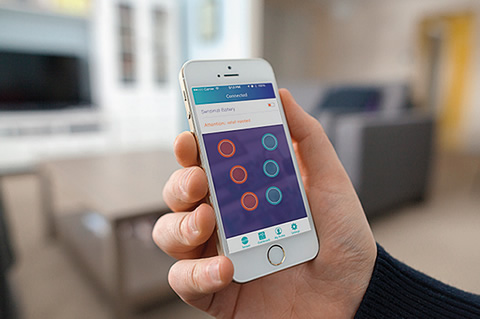Seven years ago, Philip Stiles suffered a debilitating spinal injury that left him unable to walk, and with minimal movement in his hands. Within just a couple of weeks, he developed a pressure ulcer on his back that became infected and had to be surgically treated. “I didn’t get out of bed for 2½ months,” he says.
For people with severe mobility problems, pressure ulcers are a common – and serious – problem. Sitting or lying in the same position for a long time eventually cuts off the blood flow to an area, causing the tissue to die and a sore to form. Even a small sore that’s treated effectively still carries a high risk of infection. This can lead to surgeries, hospitalization and even death.
But a new pressure-sensing system developed by David Mravyan, founder of Sensimat Systems, and Milos Popovic, a professor at the Institute of Biomaterials and Biomedical Engineering, could make a world of difference.
The Sensimat is designed to help wheelchair users prevent pressure sores from forming in the first place, by outfitting the user’s chair with a sensor-lined mat. Once the user sits in a chair, the mat, using Bluetooth technology, sends signals to a smartphone app that alerts the user when they need to shift their weight – and where – once pressure has begun to build up. Red indicates trouble spots; green, pressure free zones.
Alerts can be monitored remotely, making it useful for caregivers and for health professionals such as occupational therapists, who might want to track their patients’ activity outside the clinical setting.
According to recent data, 2.2 million people in the U.S. and Canada rely on wheelchairs. As many as 350,000 suffer from spinal cord injuries; 95 per cent of this group will develop a pressure ulcer at some point in their lives.
Sensimat Systems, which has patented its sensing technology, is now looking at ways to expand the system for use in long-term care facilities. Rather than waiting for set rotation hours, caregivers could respond to alerts from the Sensimat to move bed-bound patients when they need to shift position. Data can also be collected over the course of weeks or even months. “What this system offers is a quality metric for long-term care reporting,” says Mravyan.
The Sensimat is currently undergoing testing at the Lyndhurst Centre, part of the Toronto Rehabilitation Institute. And in April, the company raised almost $17,000 in a crowdfunding campaign to help bring its product to market.
“We want to get it into the community now. Based on the feedback we receive we’ll be able to refine the product, raise more investment funds, and significantly improve quality of life for wheelchair users everywhere,” says Sensimat Systems co-founder Will Mann.
Watch a video about how Sensimat works
Recent Posts
U of T’s 197th Birthday Quiz
Test your knowledge of all things U of T in honour of the university’s 197th anniversary on March 15!
Are Cold Plunges Good for You?
Research suggests they are, in three ways
Work Has Changed. So Have the Qualities of Good Leadership
Rapid shifts in everything from technology to employee expectations are pressuring leaders to constantly adapt





